Print Entire Issue

Directly Speaking
Columns
Leadership Profile
Government Affairs Report
Hi-Tech
New Practitioners Network
Features
Public Act 100-0564 - Mandated Registration with the PMP - FAQs
2018 Pharmacy Legislative Day
Professional & Educational Affairs Article Series
College Connection
Midwestern University Chicago College of Pharmacy
Roosevelt University College of Pharmacy
Rosalind Franklin University
More
Upcoming Events
Officers and Board of Directors
Welcome New Members!
ICHP Pharmacy Action Fund (PAC) Contributors
 Directly Speaking
Directly Speaking
Let’s Get A Jump On The New Year!
by Scott A. Meyers, Executive Vice President
Wow, 2018 is here already! Seems like just last month I was writing 2017 on everything! Actually, I was but seems like last month was last January. They say, “Time flies when you’re having fun!” (Don’t really know who the original “they” were but I’ve heard it a lot!) Well, the older I get, the faster time goes whether I’m having fun or not, so it’s important to get a jump on things in the new year to make sure I don’t have things left over when time runs out in 2018!
With that intimidating note, I want to encourage each of you, especially you PICs (Pharmacists-In-Charge) out there, to get a jump on a couple of tasks you should be doing every year. The first is your Department’s self-inspection. The Illinois Department of Financial and Professional Regulation now requires that every pharmacy complete a self-inspection annually and maintain a record of it for five years, just like every other record required in pharmacy! If you’ve never seen one of these inspection forms, I promise I won’t tell, but you can find one for On-site Institutional Pharmacies
right here! If your institution has an outpatient pharmacy
here’s your form. You need to complete these annually for any one or ones you are responsible. If your time to self-inspect is in the summer or fall, at least take this time to go to your calendar and add at least two or three reminders so you don’t forget and get caught empty-handed. The one thing that I’ve heard recently from all of you is that the Department investigators are beginning to make their rounds in the hospitals again!
And once the self-inspection is completed, don’t forget to correct the deficiencies you’ve found. A completed form that identifies shortcomings that haven’t been corrected is almost as bad as no form at all. It points the investigators right to your problems. But no form is actually worse. The investigators are good; they will find your deficiencies and still ding you for not having the form too.
Second, make sure you’ve taken that annual Controlled Substance inventory. CII meds need to be accurately counted and documented and CIII-V’s need to approximated and documented. Another item that will quickly bring you face-to-face with a member of the Board of Pharmacy and various and sundry members of the Department of Financial and Professional Regulation staff! The Department doesn’t provide a form for this so use your formulary to get a print out and make sure that when it is completed it is signed by the PIC and at least one other registrant under the Act (that means pharmacist, pharmacy technician or yes, you can use a student pharmacist!). And again, put a couple reminders in your calendar if this is a mid-year or end-of-the-year task! Plus, don’t forget that if the PIC changes during the year, an inventory must be done, with or without the old PIC! But the new PIC must sign!
I’m sure there’s probably more tasks like this to knock out early, but these two can have significant consequences if you forget. So kick off your New Year with these two tasks under your belt, you’ll have a great start and two less things to worry about during 2018. Get a jump on 2018! You’ll appreciate it later.
Columns
Leadership Profile
Meet Abby A. Kahaleh, BPharm, MS, PhD, MPH
ICHP Spotlight Interview
Abby Kahaleh, BS Pharm, MS, PhD, MPH
What is your current leadership position in ICHP?
Volunteer activities on Divisions, Committees and Networks:
- Marketing Affairs Division Member in 2016 and 2017
- Ambulatory Care Network Member in 2016 and 2017
- Annual Meeting Planning Committee in 2014, 2015, 2017
- Spring Meeting Planning Committee in 2016
Volunteer activities on individual projects:
- Best Practice Judge in 2015
- Poster abstract reviewer
- Poster judge
Volunteer contributions or offers to assist:
- Submitted posters either alone or encouraged students to submit
- Speaker or facilitator for the ICHP Annual Meeting 2014-2017
- Moderator at the Annual Meeting 2017
- Offers to assist with any needs during the state meetings
- Diligent in speaking to vendors in exhibit hall to thank them for attending
- Submitted articles for publication in KeePosted
- Regularly attend Legislative day and serves as a group leader – frequently securing appointments to meet with legislators
What benefits do you see in being active in a professional association such as ICHP?
Since 2011, I’ve enjoyed being an active member of ICHP for the following main reasons:
- Networking with my colleagues in academia and various practice settings
- Advocacy for advancing pharmacy practice in Illinois
- “Keeposted” on current topics that impact our profession
- Being a good role model for current and future pharmacists
- “Giving back” by paying it forward as a thank you all my mentors
What initially motivated you to get involved in ICHP?
In 2010, I received an offer from the Founding Dean at the Roosevelt University College of Pharmacy to join the college as the Associate Dean for Experiential Education. I participated in the initial Accreditation Council for Pharmacy Education (ACPE) site visit. At that time, Scott Meyers was serving on the College Professional Council. I successfully collaborated with Scott to establish the ASHP-SSHP Chapter for the Roosevelt College of Pharmacy.
Where did you go to school?
After I completed my BS degree at the University of Damascus, I obtained a Masters in Pharmaceutical Sciences from the University of Toledo in Ohio. Afterward, I completed a Masters in Health Management and Policy degree from the School of Public Health and a Doctorate in Philosophy (Pharmacy) from the College of Pharmacy at the University of Michigan at Ann Arbor.
Where have you trained or worked?
I completed six training certifications from the American Pharmacists Association (APhA) in immunizations, diabetes management, dyslipidemia, OTC, MTM, and advanced motivational interviewing.
I worked as an Assistant Dean of Experiential Education at Lake Erie College of Osteopathic Medicine COP prior to joining Roosevelt University. I am currently a tenured faculty at RUCOP.
What special accomplishments have you achieved?
I served as a presidential officer at the American Association of Colleges of Pharmacy (AACP) for the Experiential Education Section, Chair of the Public Health SIG Development Committee, Chair of the Curriculum SIG, and the Chair of Communications and Collaborations of the Global Pharmacy Education SIG. Also, I had the privilege to serve as an ACPE Site-Evaluating Team for national and global pharmacy programs.
At ASHP, I served as a national chapter advisor for SSHP. In addition, I served as a reviewer and judge for the managers, practitioners, and residents sections.
At ICHP, I received the “Shining Start Award”. Recently, I received the “2017 ICHP Outstanding Volunteer Award.“
Describe your current area of practice and practice setting:
I teach, conduct research, and provide professional service at the Roosevelt University College of Pharmacy. I also present and publish at global, national, regional, and local pharmacy meetings.
Is there an individual you admire or look up to, or a mentor that has influenced your career?
I respect, admire, and look up to our 2017 ICHP award winners -- Pharmacist of the Year, Desi Kotis and Professor Mary Lee
What advice would you give to student pharmacists?
Get involved in pharmacy organizations like ICHP/IPhA to advocate for your pharmacy profession. Otherwise, someone else will be making decisions that will impact your future career.
What pharmacy related issues keep you up at night?
The lack of “provider status” and sustainable reimbursement model for Pharmacist Patient Care process that will ultimately impact public health in IL.
Do you have any special interests or hobbies outside of work?
I enjoy working out outdoors (running, hiking, walking)
Do you have a favorite restaurant or food?
What is your favorite place to vacation?
Hawaii (Canoeing, Snorkeling, Zip lining)
What is the most interesting/unique fact about yourself that few people know?
I love to sketch. I get inspired after visiting the “Art Institute of Chicago”.
What 3 adjectives would people use to best describe you?
- Achiever
- Professional
- Compassionate
Government Affairs Report
The CPTF and the PMP: More Than Just Letters
by Jim Owen and Scott Meyers
Many of you know that the PMP is an acronym for the Prescription Monitoring Program used in Illinois and most other states (all but Missouri) to monitor controlled substance prescriptions in the outpatient setting. You will see more and more discussions about the PMP as the opioid crisis awareness continues to grow. The CPTF on the other hand is a new abbreviation for Illinois’ newly established Collaborative Pharmaceutical Task Force (CPTF). Acronyms are a huge part of pharmacy just as they probably are with every industry so adding new ones should not surprise anyone. But their importance is often overlooked at the time of introduction only to eventually develop as they are used over and over again.
So, if that’s the case, let’s start making the importance of the PMP and CPTF greater right now! Tackling the PMP first, how many of you have registered with the PMP so that you can use it when reviewing outpatient or even inpatient orders? You know you should not only register with the PMP but jump in and really get to know it. That’s a primary way we can stop the opioid crisis! I (Scott) would love to say that I have registered but unfortunately, I don’t work in a real pharmacy and so the last thing I want to do is jeopardize my still active pharmacist license by lying on a state registration form! You do have to identify your primary workplace when you register.
But every one of you pharmacists reading this who do work in a licensed pharmacy need to get busy and register and learn your way around the PMP. SB772 which was signed in mid-December and went into effect on January 1, 2018 allows every prescriber and pharmacist registrant to also delegate access to the PMP to up to three designees. So I encourage all of you to entrust your most reliable technicians with this opportunity and especially if you have med-rec or clinical techs on your staff so they can help you do the screening. While SB772 or Public Act 100-0564 as it is now known, does not require accessing the PMP for inpatient orders for controlled substances, that doesn’t mean you shouldn’t anyway. It’s probably a good idea to screen every patient for a history of opioid abuse at initial admission and pre-operatively if you can. You never know what you might uncover. There’s an article in the December KeePosted with all the details of the bill if you want to learn more which can be quickly accessed
here.
As for the CPTF, that creation will get legs very soon as the first meeting is scheduled for the second Tuesday of January (the 9th) in the afternoon following the morning Board of Pharmacy meeting. At the time of this writing not all members of the CPTF have been appointed by the legislative leaders yet but by the 9th of January, they should all be in place and ready to begin work. But “What is the work of the CPTF?” you may ask. The CPTF was established by HB3462 or now Public Act 100-0497 which extended the Illinois Pharmacy Practice Act for two more years (through the end of 2019) and made several other minor changes to it, as reported in earlier issues of the KP (KeePosted – we love our acronyms!).
The CPTF will be made up of representatives from ICHP, IPhA, IRMA (Illinois Retail Merchants Association), ISMS (Illinois State Medical Society), IHA (Illinois Hospital and Health-System Association), ISCP (Illinois Society of Consultant Pharmacists), one representative of organized labor representing pharmacists, and a Chair. The CPFT will also have three non-voting members representing the UIC College of Pharmacy, the Department of Financial and Professional Regulation, and a pharmacist with a background in patient safety and IT (Information Technology).
The CPFT has been charged with reviewing the Pharmacy Practice Act and discussing “how to further advance the practice of pharmacy in a manner that recognizes the needs of the healthcare system, patients, pharmacies, pharmacists and pharmacy technicians.” The discussions will consider at a minimum the following:
- Whistleblower protections for pharmacists and pharmacy technicians for violations of worker policies,
- Requiring pharmacies to have at least one technician on duty whenever the practice of pharmacy is conducted,
- Setting prescription filling limits of not more than 10 prescriptions per hour,
- Requiring at least 10 technician hours per 100 prescriptions filled,
- Placing a general prohibition on activities that distract pharmacists,
- Providing the pharmacist with at least two 15-minute paid rest breaks and one 30-minute meal period in each workday on which the pharmacist works at least 7 hours,
- Prohibit making the pharmacist work through those breaks and, if that does occur, paying the pharmacist triple time for the entire shift,
- Providing a clean and comfortable break area with table and chairs for said breaks,
- Limit the pharmacist work shift to no more than 8 hours per day,
- Retaining records of errors in the receiving, filling, or dispensing of prescriptions of any kind,
- Requiring pharmacy systems to contain mechanisms that requires prescription discontinuation orders be forwarded to the pharmacy,
- Require patient verification features for pharmacy automated prescription refills, and
- Require that automated prescription notices clearly communicate to patients the medication name, dosage strength, and any other information required by the Department.
These bullet points must be discussed but may or may not be included in any revisions to the pharmacy practice act. But you can clearly see the tasks ahead for the CPFT are not small. In addition, the actions recommended by the CPFT will most definitely have a future on the practice of pharmacy for years to come.
So the PMP and CPFT are definitely more than letters! Please continue to watch for more information in this column and in e-mail alerts as we continue to work for you and for pharmacy on ICHP’s behalf.
Hi-Tech
UI Health Pharmacy Tech Task Force - Social Mixer Highlights
by Leann Nelson, Communications Manager
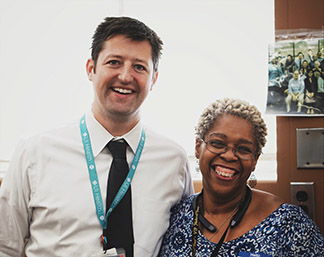 The Pharmacy Technician Task Force Committee of UI Health
held a Social Mixer on September 13, 2017. Clara Gary, ICHP Technician
Representative, reported that the event was a great success and attended by approximately
70 people (technicians and students).
The Pharmacy Technician Task Force Committee of UI Health
held a Social Mixer on September 13, 2017. Clara Gary, ICHP Technician
Representative, reported that the event was a great success and attended by approximately
70 people (technicians and students).
During the event, CE Credit and an ICHP Informational
Webinar were provided. The committee also compiled surveys and will be working
with the facility administration on the items that were determined to be most
important to the technicians which included mentorship, training and finding
opportunities for advancement.
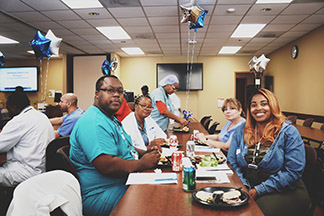
Clara credits the ICHP Double Dose promotion as being a
helpful tool to recruit several new ICHP members at the event.
Rita Edwards, Ina Henderson, Dina Velez, and Margie
Villarreal (Members of the UI Health Pharmacy Technician Task Force Committee) along
with their Pharmacist Mentors (Adam Bursa and Christine Godwin) worked hard to
coordinate and execute this successful event. They were also aided by the
support of Andy Donnelly (Director of Pharmacy) and Sandra Durley (Assistant
Director of Ambulatory Care Pharmacy).

New Practitioners Network
Educating the Underserved on Medication Adherence: An Interdisciplinary Collaboration Between Schweitzer Fellows and the New Practitioner’s Network
by Samah Qasmieh, PharmD and Bernice Man, PharmD
The Albert Schweitzer Fellowship is a service fellowship that aims to create healthcare leaders who will positively impact underserved and vulnerable populations facing health inequities. Graduate students from a multitude of healthcare disciplines create service projects that target underserved populations who experience barriers to healthcare. Healthcare disciplines represented in the fellowship include pharmacy, medicine, nursing, law, disability studies, podiatry, dentistry, social work, and art therapy, among others. Examples of underserved populations include prisoners, homeless and housing insecure, low-income, immigrant, LGBTQ, and disabled individuals. Specific geographic neighborhoods are also included. Fellowship chapters currently exist in 15 cities across the country, including San Francisco, Boston, New Orleans, and Chicago. The Chicago Area program selects 30 fellows annually and is particularly diverse with representation in recent years from Northwestern, University of Chicago, Loyola, Rush, UIC, DePaul, Illinois College of Optometry, Rosalind Franklin, Dominican, the School of the Art Institute, Columbia College, and Chicago State. Over the past ten years, ten fellows have represented the pharmacy profession in the Chicago Area program. Upon acceptance into the fellowship, Schweitzer fellows partner with a community-based organization to administer their 200-hour service project over the course of a year. Examples of past pharmacy fellow projects include delivering disease state presentations in Cantonese to older, adult, Chinese immigrants in Chinatown and leading a medication therapy management program at a clinic for uninsured individuals.
On October 29th, volunteers from the New Practitioner’s Network (NPN) delivered a presentation on medication adherence to homeless and housing insecure clientele at the EZRA Multi-Service Center in Chicago’s Uptown neighborhood. The morning started with meeting Schweitzer fellow Tyrone Johnson and his colleague David Gu, second-year medical students at the University of Chicago Pritzker School of Medicine and Northwestern Feinberg School of Medicine, respectively. We spent time inquiring about the center’s clientele to personalize and tailor the medication adherence presentation as much as possible. Upon first meeting the audience, about 15 women, we quickly learned the group was very diverse in terms of health literacy. Because of this variety, we started the presentation with asking the group, “What does adherence mean to you?” and then going over the basic tenets of medication adherence. Furthermore, we explained the importance of medication adherence and related how good adherence can reduce the amount of emergency room visits and total health care costs.
We spent a lot of time reviewing strategies on how the group could remain adherent with their medications. We had a very collaborative discussion with our audience. One of the clients shared her experience with a mobile phone app that she uses to organize all of her medications and upcoming appointments. Though our original goal was to present on medication adherence, we ended up spending the majority of the time getting to know the clientele via bi-directional, open dialogue. We had heart-to-heart conversations with them and learned what their individual barriers were to medication adherence. A common barrier we observed was a lack of understanding of the indication for each medication. Many of the clientele were frustrated because they felt their questions and concerns were not adequately addressed by their providers. Although we were limited by time, we addressed as many concerns and answered as many questions as possible. We truly felt they left feeling more confident and reassured than they did before our discussion. Some of the clientele were so engaged that they stayed after the session to ask more questions. Upon further reflection after the event, we will aim to encourage participation from every single member of the audience in future presentations.
It was an incredibly rewarding and humbling experience to meet people of different backgrounds and for everyone to learn from each other. The NPN has other potential Schweitzer collaboration projects pending and we look forward to holding another event soon.
Features
Public Act 100-0564 - Mandated Registration with the PMP - FAQs
Answers from the staff at the Illinois Department of Human Services
Feature Article
by Scott A. Meyers, Executive Vice President

2018 Pharmacy Legislative Day
Registration is Open!
Feature Article

Registration is now open for the 12th Annual Under the Dome: Illinois Pharmacy Legislative Day to by held Wednesday, March 7th in Springfield, Illinois. Pre-registration is required. Registration deadline is February 21, 2018.
Join hundreds of pharmacy professionals at the State Capitol on March 7, 2018!
|
|
Represent your profession and speak directly to legislators and staff regarding the critical issues facing pharmacy. It is vital that your legislators become more knowledgeable on the role of pharmacy in augmenting healthcare.
Learn about key issues and how to discuss them with your legislators. Join your fellow pharmacists, students & techs and become part of the solution. Don't miss this opportunity to let your collective voices be heard!
Photo ID: All persons visiting the Capitol Building must present a government issued photo ID.
|
| Schedule of Events (tentative) |
| 10:30 AM - 12:30 PM |
Check In
Auditorium, Howlett Building |
| 11:00 AM - 12:15 PM |
Lunch
Hall of Flags, Howlett Building |
| 12:30 PM - 2:00 PM |
CPE Legislative Orientation
Auditorium, Howlett Building |
| 2:30 PM - 4:45 PM |
Capitol activities including
legislator visits
Government issued ID is required |
| 5:15 PM |
Bus Departure |
|
|
Motorcoach: Bus transportation to and from Springfield will be available. Be sure to mark your pickup location on the registration form. Departure times to follow. A separate transportation charge applies if you need to ride on one of the motor coaches departing from Chicago State University COP, Midwestern University COP, Rosalind Franklin COP, Roosevelt University COP, SIUE School of Pharmacy, St. Louis COP, University of Illinois at Chicago College of Pharmacy or the UIC Rockford Campus. Space is limited on these buses so early registration is strongly suggested.
|
Jointly sponsored by Illinois Council of Health-System Pharmacists and the Illinois Pharmacists Association. For the past twelve years, ICHP and IPhA have joined forces to let lawmakers know that pharmacists stand united.
Pre-registration is required. Registration deadline is February 21, 2018!
You won't wan to miss this important and exciting opportunity to learn about and support your profession!
Click here for all the details or to register. You can register online or print a registration form which may be mailed or faxed to the ICHP office.
|
|
|
Professional & Educational Affairs Article Series
Acknowledgement of 2017 Peer Reviewers
Feature Article
by Jen Phillips, PharmD, BCPS, Editor, KeePosted
Articles for both of these columns are peer-reviewed. The editors and ICHP staff would like to acknowledge the following individuals for their willingness to provide valuable feedback to authors in the 2017 calendar year! Thank you for your efforts and contributions to KeePosted!
Antoine Jenkins
David Martin
Milena McLaughlin
Jen Phillips
Karin Terry
Susan Winkler
If you are interested in submitting an article to the Educational Affairs or Professional Affairs series, please refer to the article submission
guidelines. Contact Jen Phillips (
Jennifer.a.phillips@gmail.com) for more information.
College Connection
Midwestern University Chicago College of Pharmacy
Student Interview: Profile of a Pharmacy Student’s Journey
College Connection
by Ziad Dabbagh, PS-2, ICHP Historian
The Division of Educational Affairs and the Division of Professional Affairs each have standing columns in each edition of KeePosted. Lisa Nguyen is currently a fourth year Doctor of Pharmacy Candidate at Midwestern University Chicago College of Pharmacy. She began her journey in 2014 due to an interest in science and a curiosity about how medications work. Lisa was previously our chapter’s historian and I had the pleasure of interviewing her regarding her experiences in pharmacy school thus far.
Lisa first became involved in pharmacy school during her first-year through Phi Delta Chi, a pharmacy fraternity with an emphasis on networking and professionalism. She knew that she wanted involvement with a smaller campus organization. She believes that this offers more room for personal growth and allows her to make more of an impact. Lisa reminisces on the time that she ran for “class vice-president, failed, and was discouraged; but told herself that [she] won’t ever get a position if [she doesn’t] keep trying and that it’s okay even if everyone knew [that she] lost.” Lisa viewed this failure positively, as an experience for personal growth and development.
During her second year, Lisa ran for leadership roles in the Illinois Council of Health System Pharmacists (ICHP) as Historian, the Student National Pharmacist Association (SNPhA) as Membership Chair, and the Academy of Managed Care Pharmacy (AMCP) as their Director of Professional Relations. She was elected to two of the three positions and she began working with professional organizations. Working with SNPhA allowed Lisa to further develop critical leadership skills which she would go on to use later in her career as a student. For AMCP, she organized a round table event which included over nine pharmacists and forty student attendees. Lisa’s second year culminated in her induction into Rho Chi . During the summer, she went on a humanitarian medical mission trip to Peru.
Lisa began her third year of pharmacy school with excitement. She had one year of didactic coursework left, and she won the election for the ICHP Historian role. Lisa enjoyed this role as she promoted events on social media while be able to express her creativity at the same time through photos. Lisa continued her involvement with organizations. This year she was the Vice President for SNPhA, treasurer for AMCP, and picked up a new position as the secretary for the American Association of Pharmaceutical Scientists (AAPS). Looking back at all of these positions, Lisa has, “learned how much work it is to plan events due to all the things you have to consider, like having a trash can for catered food and a microphone, etc; This goes hand-in-hand with time management, something that is so valuable to a student. Balancing school, work, friends, family, and extracurricular activities is hard.” Lisa informed me that an important lesson that she has learned from her experiences is the knowledge that, “we are surrounded by people, so knowing how to work with or approach someone is invaluable and a life-long lesson.” A bittersweet ending to third-year came with the realization that while pharmacy is a small world, many classmates go their own way and pursue their own individual paths.
Lisa is currently on rotation in California where she is, “not as exposed to opportunities, but just [has] to look for them.” I asked Lisa what her immediate goal was after graduation. She alluded to wanting to be a clinical pharmacist but is keeping options open. She let me know that while physicians are the ones who diagnose and determine treatment, “pharmacists are important to the healthcare team because they create and manage a patient’s treatment plan.” She believes that clinical pharmacy is the future and is an advocate for provider status and foresees that the “pharmaceutical industry is going to be very big with so many new drugs in development and the need for more pharmacists to provide accurate and fair-balanced information.” Lisa looks forward to graduation and leaves her colleagues with the following point to consider, “be involved, try new things, even if it makes you uncomfortable as you can’t go back in time and may end up wishing you had done something.”
Roosevelt University College of Pharmacy
Residency 101: The Road to Residency
College Connection
by Patrick Tednes, PS-3, SSHP Vice President
Our SSHP chapter recently hosted a topic discussion about “The Road to Residency” led by Roosevelt University faculty member and Northwestern Memorial Hospital clinical pharmacist, Dr. Craig Cooper, BS, PharmD, BCCCP, BCPS. In his discussion, Dr. Cooper addressed how to build a CV worthy of attaining a residency position. Following his presentation, he facilitated a question and answer session to address audience concerns regarding residency. The topic discussion was open to all Roosevelt University College of Pharmacy (RUCOP) students and approximately 30 students attended.
Major talking points that Dr. Cooper addressed during his talk included grades/transcripts, working as a student, and student involvement in organizations. Dr. Cooper discussed how grades are not all that important in the application process for potential residents which was surprising to many students in the room. He went on to discuss how grades do not tell the whole story of a student; rather, there are many other aspects of a person that are indicative of how successful that particular person would be as a resident. He further explained how incorporating work, participation in volunteer opportunities, and involvement in student organizations into a CV can show that a student is well-rounded and able to manage their time efficiently. Being able to manage classwork, working, and student organizations shows the ability to balance multiple aspects of life. Working, specifically in pharmacy-related positions, shows that the student is capable of managing time appropriately and also gives students an upper edge in the field of pharmacy. Regarding participation in student organizations, Dr Cooper explained the importance of having an active role within the organization and highlighting any leadership roles. Leadership positions demonstrate that a student is able to plan events, host guest speakers, manage members, etc.
Dr. Cooper went on to address several questions from the audience. The first question was about the difference between applying for a residency at a smaller institution versus at a larger, academic institution. Dr. Cooper discussed how each type of program has their own perks and choosing the right program depends on the goals of the individual student. He pointed out some key differences between larger and smaller programs. Smaller programs may have more one-on-one experiences with preceptors; however, they may not having as many elective rotation options. Smaller institutions are also likely to have fewer resident positions available. Another question revolved around the importance of a post-graduate year 2 (PGY2) residency and what opportunities may be available after completing a specialty residency. His response was that a post-graduate year 1 (PGY1) residency “opens the door that may have been closed” in terms of applying for clinical pharmacist jobs after graduation. However, even though a door may be opened, a resident may not be able to “walk through” the door after completing a PGY-1 residency. Dr. Cooper further explained that a PGY2 residency allows a resident to “walk through” the door that was opened from the completion of a PGY1 residency. Completing both a PGY1 and PGY2 gives a pharmacist a great edge in the job market and helps solidify positions that may not have been achievable right out of pharmacy school or after one year of residency.
In the concluding thoughts of his talk, Dr. Cooper stated the importance of keeping CVs as up-to-date as possible and making sure that it accurate. He explained that it is imperative for students have their CVs proofread and edited by both a healthcare professional and a non-healthcare professional. He also reiterated the importance of building your CV to highlight your accomplishments of working, volunteering, being involved in student organizations, and presenting posters.
Rosalind Franklin University
Our First ICHP Clinical Roundtable
College Connection
by Drew Bailey, PS-3, ICHP Professional Chair
It IPPE and APPE rotations allow students to work with practicing pharmacists in order to gain a better understanding of the profession and improve their clinical expertise. However, it can be difficult for students to find opportunities to speak with faculty about their activities at their clinical practice site early in pharmacy school. This past summer, I attended a pharmacy roundtable that covered many pharmacy career opportunities pharmacists at the Kappa Psi Grand Counsel Convention. Opportunities represented at the event included academia, industry, clinical, retail, government, and many more. After participating in this event, I wanted to recreate this experience for pharmacy students at Rosalind Franklin University.
Unlike the event at the conference, our ICHP chapter wanted to focus on health system pharmacy. I reached out to many of the faculty as well as pharmacists with which I have previously worked that practiced in various health-systems or clinics. There was a variety of faculty who participated, including those who specialized in emergency medicine, mental health, solid-organ transplant, and oncology. The faculty were very excited to share their experiences in their respective specialties with students.
We had about 25 of our ICHP members sign up for the one hour event and 6 faculty members. At our event, students were provided a signup sheet along with a pharmacy pathway survey. This survey allowed students to discover their interests. The survey had basic questions about interests including job security, using clinical skills, ability to spend time with family, and much more. Students were asked to prepare questions for the faculty prior to the event. To start the event, faculty provided a two-minute overview of their typical day. The groups then were able to speak with each of the professors for about ten minutes before they rotated tables.
Our ICHP chapter received positive feedback from both the faculty and students. A faculty member emphasized that it is important to generate student interest in various pharmacy specialties early in their pharmacy careers, and that this event was a great opportunity. We hope to continue this event in the future and make improvements each year such as increasing the amount of time at each table.
More
Upcoming Events
Visit the ICHP Calendar for the most up-to-date events! 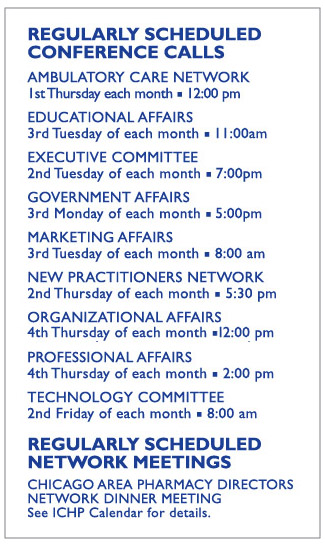
View our events on Facebook
Tuesday, January 9, 2018 - 6:00PM
Use of Ketamine and Lidocaine in Acute Pain Management
Jessica
Lorenson, Pharm.D.
PGY-1 Pharmacy Resident
Sangamiss LIVE Program
Location:
Mariah's Restaurant
3317 Robbins Road, Springfield, IL
Accredited for pharmacists and
pharmacy technicians.
Watch for more information in
upcoming news briefs.
Wednesday, January 10, 2018
Spring Meeting Posters Due!
Wednesday, January 17, 2018 - 6:00PM
NISHP Double Feature
Presentation #1:
Anticoagulation
Vicki Groo,
Pharm.D.
Clinical Associate Professor of Pharmacy Practice and Medicine, Section
of Cardiology, University of Illinois at Chicago
Sponsored
by Bristol-Myers Squibb
(Presentation #1 is
not available for continuing pharmacy education.)
Presentation #2:
Management of Lipids
Erika Hellenbart, Pharm.D.,
BCPS
Clinical Assistant Professor at the University of Illinois at Chicago
College of Pharmacy and Clinical Pharmacist at the University of Illinois
Hospital and Health Sciences System; and
Emily Armgardt, Pharm.D.
PGY-1
Pharmacy Practice Resident, University of Illinois at Chicago College of
Pharmacy
Sponsored by ICHP
Presentation #2 is accredited for pharmacists
and pharmacy technicians | 1.0 contact hour (0.1 CEU)
Follow us! Find us here:

http://twitter.com/ichpnet

http://instagram.com/ichpnet

http://linkedin.com/company/ichpnet

http://facebook.com/ichpnet
Officers and Board of Directors
 Noelle Chapman
Noelle Chapman
President-Elect
Regional Directors
Technician Representative
Network and Committee Chairs - non-voting
 Jennifer Phillips
Jennifer Phillips
Editor & Chairman KeePosted
Committee Chair,
Nominations Committee
(630) 515-7167
jphillips@midwestern.edu
Welcome New Members!

| New Member |
Recruiter |
| Ahmad Basil |
Milena McLaughlin |
| Colleen Blackshear |
Travis Hunerdosse |
| Arqam Hakeem |
|
| Kathryn Joos |
|
| Kristina Khaireddine |
Kimberly Zaleski |
| Sara Koehnke |
|

ICHP Pharmacy Action Fund (PAC) Contributors
ADVOCACY ALLIANCE - $2500-$10000
Kevin Colgan
Edward Donnelly
James Owen Consulting Inc.
Frank Kokaisl
Scott Meyers
Michael Novario
Thomas Westerkamp
LINCOLN LEAGUE - $1000-$2499
Sheila Allen
Ginger Ertel
Ann Jankiewicz
Jan Keresztes
Kathy Komperda
William McEvoy
Michael Rajski
Christina Rivers-Quillian
Carrie Sincak
Avery Spunt
JoAnn Stubbings
CAPITOL CLUB - $500-$999
Margaret Allen
Tom Allen
Peggy Bickham
Travis Hunerdosse
Leonard Kosiba
Mary Lee
Janette Mark
Jennifer Phillips
Edward Rainville
Kathryn Schultz
Tara Vickery-Gorden
Jill Warszalek
Cathy Weaver
Alan Weinstein
GENERAL ASSEMBLY GUILD - $250-$499
Jen Arnoldi
Scott Drabant
Brad Dunck
Michael Fotis
Charlene Hope
Kim Janicek
Kenneth Miller
Peggy Reed
Carrie Vogler
Marie Williams
SPRINGFIELD SOCIETY - $100-$249
Kathy Cimakasky
Linda Grider
Glenna Hargreaves
Milena McLaughlin
Kit Moy
Danielle Rahman
GRASSROOTS GANG - $50-$99
Marc Abel
Antoinette Cintron
Veronica Flores
Ina Henderson
Leslie Junkins
Richard Kruzynski
Connie Larson
Nan Lundquist
Michelle Martin
Rebecca Ohrmund
Kathryn Wdowiarz
CONTRIBUTOR - $1-$49
Gabriel Ahiamadi
Aprille Banchoencharoensuk
Angelia Dreher
Kathy Eakright
Kimberly Gibson
Janet Hinkes
Dawn Hunsberger
Abby Kahaleh
Vera Kalin
Karin Terry
Karen Trenkler
Izabela Wozniak

Print Entire Issue

 Directly Speaking
Directly Speaking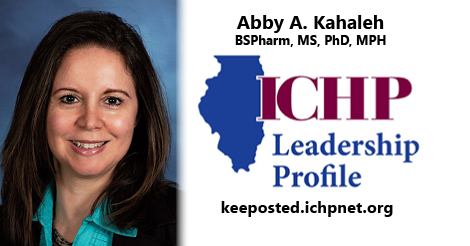
 The Pharmacy Technician Task Force Committee of UI Health
held a Social Mixer on September 13, 2017. Clara Gary, ICHP Technician
Representative, reported that the event was a great success and attended by approximately
70 people (technicians and students).
The Pharmacy Technician Task Force Committee of UI Health
held a Social Mixer on September 13, 2017. Clara Gary, ICHP Technician
Representative, reported that the event was a great success and attended by approximately
70 people (technicians and students). 

 If an inpatient is being ordered a new controlled substance for in hospital use, does the prescriber and dispenser (or their designees) have to access the PMP first before prescribing or dispensing? And if so, are both required to document accessing the PMP in the EHR?
If an inpatient is being ordered a new controlled substance for in hospital use, does the prescriber and dispenser (or their designees) have to access the PMP first before prescribing or dispensing? And if so, are both required to document accessing the PMP in the EHR?  Public Act 100-0564 States the following:
Public Act 100-0564 States the following:
 If the patient is receiving one dose of a pre-op Controlled Substance during an outpatient surgery, is accessing the PMP and documentation required?
If the patient is receiving one dose of a pre-op Controlled Substance during an outpatient surgery, is accessing the PMP and documentation required? It would not be required if the prescriber is not issuing an actual prescription, but it would still be considered best practice to know the patient's controlled substance history.
It would not be required if the prescriber is not issuing an actual prescription, but it would still be considered best practice to know the patient's controlled substance history. Is there a limit to the number of designees a prescriber or dispenser may have?
Is there a limit to the number of designees a prescriber or dispenser may have?  Yes, they are limited to three, the administrative rule can be found on our website or you can follow the link below for more information:
Yes, they are limited to three, the administrative rule can be found on our website or you can follow the link below for more information: Do they have to identify whose agent/designee they would be? Do they need any specific information from the prescriber or dispenser?
Do they have to identify whose agent/designee they would be? Do they need any specific information from the prescriber or dispenser? The designee pages are in process and we hope to have them live by January 1st. The designee and the prescribers will need to be linked with permission from both.
The designee pages are in process and we hope to have them live by January 1st. The designee and the prescribers will need to be linked with permission from both.  How does a prescriber or dispenser designate access to another individual? Do they have to go through your Department or can they just hand over their access codes?
How does a prescriber or dispenser designate access to another individual? Do they have to go through your Department or can they just hand over their access codes?  We are in the process of creating a webpage that will allow for such access, both the prescriber and designee will need to access the webpage to verify access.
We are in the process of creating a webpage that will allow for such access, both the prescriber and designee will need to access the webpage to verify access. 
 Wednesday, January 17, 2018
Wednesday, January 17, 2018  Tuesday, February 6, 2018
Tuesday, February 6, 2018  Thursday, March 15, 2018
Thursday, March 15, 2018 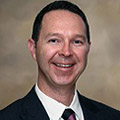 Travis Hunerdosse
Travis Hunerdosse Charlene Hope
Charlene Hope Noelle Chapman
Noelle Chapman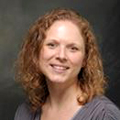 Kathryn Schultz
Kathryn Schultz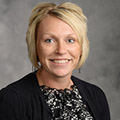 Amy Boblitt
Amy Boblitt Elise Wozniak
Elise Wozniak Lynn Fromm
Lynn Fromm Mary Lee
Mary Lee Karin Terry
Karin Terry Lara Ellinger
Lara Ellinger Carrie Vogler
Carrie Vogler Bernice Man
Bernice Man Abby Kahaleh
Abby Kahaleh David Tjhio
David Tjhio Jennifer Phillips
Jennifer Phillips Milena McLaughlin
Milena McLaughlin





 Jennifer Arnoldi
Jennifer Arnoldi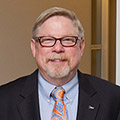 Scott Meyers
Scott Meyers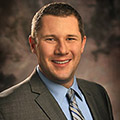 Christopher Crank
Christopher Crank Clara Gary
Clara Gary